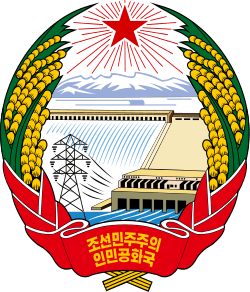Equatorial Guinea–North Korea relations
Equatorial Guinea |
North Korea |
|---|
Equatorial Guinea–North Korea relations refers to the current and historical relationship between Equatorial Guinea and North Korea. While Equatorial Guinea has no representation in North Korea, it is one of few African states to have a North Korean embassy, located in the capital of Malabo.
Diplomatic relations between Equatorial Guinea and the Democratic People's Republic of Korea (DPRK, commonly known as North Korea) were established in 1969, a year after Equatoguinean independence from Spain.[1] The country's first leader, soon-to-be President for Life Francisco Macías Nguema, would come to lead one of the most brutal regimes on the African continent. Despite his anti-communism, he maintained close relations with the Soviet Union and various pro-Soviet states, prominent among them North Korea. Like the Zairean regime of Mobutu Sese Seko, the DPRK favoured Macías Nguema regardless of his ideological opposition to Marxism–Leninism.[2]
During the early 1970s Equatorial Guinea signed military, technical and economic agreement with many socialist states, among others North Korea.[3] Troops from the Korean People's Army were also sent as advisers to the military of Equatorial Guinea.[2] Under inspiration from the Workers' Party of Korea, the sole legal party in the country was renamed from "United National' Party" to "United National Workers' Party" in July 1971.[4]
After Francisco Macías Nguema was overthrown and executed by his nephew and successor Teodoro Obiang Nguema Mbasogo in 1979, his family fled to Pyongyang, where his three children were raised by the North Korean government. One of them, Monique, left the DPRK in 1994 after fifteen years. In 2013 she published her memoirs, entitled "I'm Monique, From Pyongyang".[5]
Despite this, close relations continued after the coup, and remain active. In 2011 Yang Hyong-sop, Vice President of the Presidium of the Supreme People's Assembly, made a four day visit to Equatorial Guinea.[6] In 2013 President Teodoro Obiang Nguema Mbasogo, the world's third longest-ruling non-royal head of state and one of the richest leaders in the world, was presented the "First International Kim Jong-il Award" by a North Korean delegation.[7]
See also
References
- ↑ Onguene, Clemente Ela Ondo (3 February 2014). "The Korean Embassy celebrates the 45th anniversary of relations with Equatorial Guinea". www.guineaequatorialpress.com. Government of Equatorial Guinea. Retrieved 25 December 2014.
- ↑ 2.0 2.1 Wilber, Charles K.; Jameson, Kenneth P., eds. (2013). Socialist Models of Development. Amsterdam: Elsevier. p. 899. ISBN 148-319-029-3.
- ↑ Clarke, Duncan (2010). Africa: Crude Continent: The Struggle for Africa's Oil Prize. London: Profile Books. p. 137. ISBN 184-765-455-X.
- ↑ Vines, Alex (2009). Well Oiled: Oil and Human Rights in Equatorial Guinea. Human Rights Watch. p. 7. ISBN 156-432-516-4.
- ↑ Pearsson, James (2 October 2013). "Cold War childhood: An African dictator's daughter in Pyongyang". Reuters (London). Retrieved 25 December 2014.
- ↑ Onguene, Clemente Ela Ondo (4 June 2011). "Visit of the Vice President of the Republic of Korea". www.guineaequatorialpress.com. Government of Equatorial Guinea. Retrieved 25 December 2014.
- ↑ Obama, Javier (7 August 2013). "The President of the Republic receives the Kim Jong-il award". www.guineaequatorialpress.com. Government of Equatorial Guinea. Retrieved 25 December 2014.
| ||||||||||||||||||||
| ||||||||||||||||||||||||||||||||||||||

